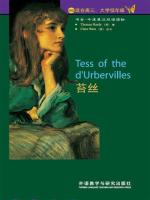Tess
"Tess of the D'Urbervilles" is a novel written by Thomas Hardy, published in 1891. It is widely regarded as one of Hardy's finest works and a classic of English literature. The story follows the tragic life of Tess Durbeyfield, a young woman born into poverty and eventually facing societal hypocrisy and personal tragedy.
The novel takes place in the late 19th century in the rural and idyllic regions of southwestern England known as Wessex, which was Hardy's fictional name for the region. Tess is introduced as an innocent and beautiful girl who belongs to a peasant family that has fallen on hard times. She is the daughter of John Durbeyfield, who learns they are distantly related to the once-wealthy D'Urberville family. In an attempt to restore their fortunes, her parents send Tess to claim kinship with the remaining D'Urbervilles.
Upon her arrival at the D'Urberville estate, Tess encounters Alec D'Urberville, the son of the nouveau riche owner. He is immediately attracted to her and manipulates her into becoming his mistress, promising financial support for her family. This relationship leads to Tess's downfall when she gives birth to a sickly child who soon dies. Traumatized by her experience and ostracized by society, Tess leaves the D'Urberville estate.
She finds work as a dairymaid on a farm owned by the Angel Clare family. There, she meets Angel Clare, the youngest son of the family. Despite her past, Tess falls deeply in love with him, and they marry. However, her happiness is short-lived when Angel discovers the truth about her past with Alec D'Urberville. Consumed by societal conventions and unable to reconcile with Tess's history, Angel deserts her and goes to Brazil, leaving Tess destitute.
In a heart-wrenching turn, Tess is driven by desperation and necessity to reunite with Alec D'Urberville, the man who had exploited her before. As she struggles to survive and provide for her family, she ultimately faces even greater tragedies.
Throughout the novel, Hardy vividly depicts the harsh realities faced by women during the Victorian era. Tess's character embodies the struggle against social norms and the double standards imposed upon women. Her pure nature is constantly juxtaposed with the sordid reality of her circumstances. Hardy uses Tess's story to criticize the rigid moral codes of the time and to expose the hypocrisy of a society that claims to value virtue while condemning those who have fallen from grace.
Hardy's portrayal of the Wessex countryside is another hallmark of the novel. His descriptions of the landscape are both beautiful and haunting, reflecting the mood and themes of Tess's life. The setting becomes a character in its own right, mirroring Tess's emotional state and reinforcing the idea of her being a product of her environment.
Furthermore, "Tess of the D'Urbervilles" is a profound exploration of fate and free will. Tess's tragic destiny seems predetermined from the start, yet she continually fights against it, seeking control over her own life. This internal conflict adds depth to her character and invites readers to ponder the role of fate in human lives.
The novel also delves into the complexities of love and passion. Tess's love for Angel Clare is sincere, but it is tested by his inability to accept her past. The contrast between Tess's pure, romantic love and Alec's lustful manipulation further illustrates the different forms love can take and the various guises under which it can be distorted.
In conclusion, "Tess of the D'Urbervilles" is a powerful narrative that offers a critical examination of Victorian society through the lens of Tess Durbeyfield's harrowing journey. It is a tale of love, betrayal, social injustice, and personal resilience. Hardy's storytelling is enhanced by his evocative descriptions of the Wessex countryside and his keen insight into human nature. The novel remains a poignant and thought-provoking read for modern audiences, resonating with themes that are still relevant today.




 京公网安备 11010802032529号
京公网安备 11010802032529号